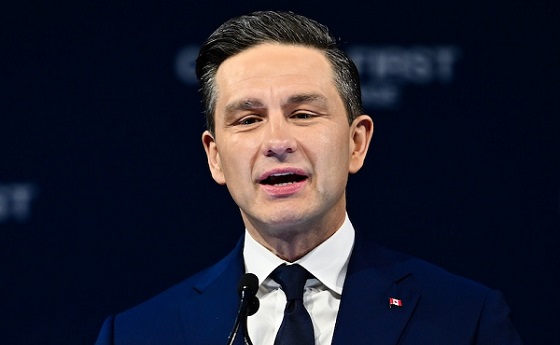Frontier Centre for Public Policy
Canada’s New Border Bill Spies On You, Not The Bad Guys

From the Frontier Centre for Public Policy
By Lee Harding
Lee Harding warns that the federal government’s so-called border bill lets officials snoop on your data, ban big cash payments and even open your mail – all without a warrant
Think Bill C-2 is about stopping fentanyl? Think again. It lets the feds snoop your data, open your mail and ban big cash payments – no warrant needed
The federal government is using the pretext of border security, the fentanyl crisis and transnational crime to push through Bill C-2, legislation that dangerously expands surveillance powers, undermines Canadians’ privacy and restricts financial freedom. This so-called Strong Borders Act is less about protecting borders and more about policing citizens.
Bill C-2, a 130-page omnibus bill introduced on June 3, grants broad new powers to government agencies to spy on Canadians and share personal information with foreign countries. A more honest title might be the Snoop and Gossip Act.
Among its most intrusive provisions, the bill would make it illegal for any business, profession or charity to accept cash payments over $10,000, even if made in smaller, related transactions. Want to pay a contractor $10,001 in five separate payments for home renovations? Too bad.
The Justice Centre for Constitutional Freedoms quickly condemned the move. “Restricting the use of cash is a dangerous step toward tyranny and totalitarianism,” the organization posted to X. “Cash gives citizens privacy, autonomy, and freedom from surveillance by government and by banks.”
Under Bill C-2, internet service providers could be compelled—under threat of fines—to hand over names, locations and “pseudonyms” of users without a warrant. Any peace officer or public officer can demand this data by merely claiming “reasonable grounds to suspect” an offence “has been or will be committed.”
It doesn’t stop there. The bill would also authorize the government to open private mail under the same vague threshold of suspicion.
Experts in law and privacy say the bill is a massive overreach. University of Ottawa internet law scholar Michael Geist and Kate Robertson of the University of Toronto’s Citizen Lab both point out that successive federal governments have sought to expand internet surveillance for years, but Bill C-2 goes further than ever before.
“Bill C-2’s big brother tactics combine expansive warrantless disclosure with unprecedented secrecy,” Geist warns. He adds that the bill “overreaches by including measures on internet subscriber data that have nothing to do with border safety or security but raise privacy and civil liberties concerns.”
If the intent were truly to combat fentanyl trafficking and transnational crime, better tools already exist. Conservative MP Frank Caputo pointed out that the bill has 16 parts but says nothing about increasing penalties or jail time for fentanyl traffickers.
“There is nothing about bail in the bill,” Caputo said during early debate on the bill. “In this omnibus bill, it says that offenders can serve their sentence for trafficking in fentanyl from their couch.”
Bloc Québécois MP Claude DeBellefeuille argued that strengthening border security requires more boots on the ground. Two rural border crossings in her riding recently had their staffed hours cut in half.
“It is estimated that the CBSA (Canada Border Services Agency) already has a shortage of between 2,000 and 3,000 border services officers for current duties. If they are given new responsibilities, however necessary, there will be an even greater shortage,” she said.
Not only does Bill C-2 contradict Supreme Court precedent. It also sets the stage for Canada to share sensitive personal information with foreign governments. In 2014, the court ruled that Canadians have a “reasonable expectation of privacy in the subscriber information” provided to internet service providers and that police requests for such data amount to a “search” requiring a warrant.
Robertson warns that the bill not only defies this precedent but also enables Canada to share this dubiously acquired information with 49 other countries under the Second Additional Protocol to the Cybercrime Convention. Canada signed the agreement in 2023 but hasn’t ratified it. Bill C-2 would make that possible.
She calls the protocol’s weak human rights safeguards “a direct threat to existing protections under international human rights law.” Robertson co-authored a submission urging the Department of Justice to reject the 2AP and instead support data-sharing frameworks that are built on consistent rights protections across all signatories.
Further complicating matters, Canada is in negotiations with the United States over a data-sharing agreement under that country’s CLOUD Act. Canada’s willingness to comply may reflect lingering trade pressures from the Trump administration, pressures that could again push Canada to compromise its legal independence and citizens’ rights.
This bill should be scrapped or thoroughly revised. Canadians should not have to surrender their privacy and human rights to serve a global law enforcement agenda that disregards civil liberties. If the line between national security and authoritarianism is erased, the greatest threat to Canadians may no longer be drug traffickers—it may be their own government.
Lee Harding is a research fellow at the Frontier Centre for Public Policy.
Business
Cutting Red Tape Could Help Solve Canada’s Doctor Crisis

From the Frontier Centre for Public Policy
By Ian Madsen
Doctors waste millions of hours on useless admin. It’s enough to end Canada’s doctor shortage. Ian Madsen says slashing red tape, not just recruiting, is the fastest fix for the clogged system.
Doctors spend more time on paperwork than on patients and that’s fueling Canada’s health care wait lists
Canada doesn’t just lack doctors—it squanders the ones it has. Mountains of paperwork and pointless admin chew up tens of millions of physician hours every year, time that could erase the so-called shortage and slash wait lists if freed for patient care.
Recruiting more doctors helps, but the fastest cure for our sick system is cutting the bureaucracy that strangles the ones already here.
The Canadian Medical Association found that unnecessary non-patient work consumes millions of hours annually. That’s the equivalent of 50.5 million patient visits, enough to give every Canadian at least one appointment and likely erase the physician shortage. Meanwhile, the Canadian Institute for Health Information estimates more than six million Canadians don’t even have a family doctor. That’s roughly one in six of us.
And it’s not just patients who feel the shortage—doctors themselves are paying the price. Endless forms don’t just waste time; they drive doctors out of the profession. Burned out and frustrated, many cut their hours or leave entirely. And the foreign doctors that health authorities are trying to recruit? They might think twice once they discover how much time Canadian physicians spend on paperwork that adds nothing to patient care.
But freeing doctors from forms isn’t as simple as shredding them. Someone has to build systems that reduce, rather than add to, the workload. And that’s where things get tricky. Trimming red tape usually means more Information Technology (IT), and big software projects have a well-earned reputation for spiralling in cost.
Bent Flyvbjerg, the global guru of project disasters, and his colleagues examined more than 5,000 IT projects in a 2022 study. They found outcomes didn’t follow a neat bell curve but a “power-law” distribution, meaning costs don’t just rise steadily, they explode in a fat tail of nasty surprises as variables multiply.
Oxford University and McKinsey offered equally bleak news. Their joint study concluded: “On average, large IT projects run 45 per cent over budget and seven per cent over time while delivering 56 per cent less value than predicted.” If that sounds familiar, it should. Canada’s Phoenix federal payroll fiasco—the payroll software introduced by Ottawa that left tens of thousands of federal workers underpaid or unpaid—is a cautionary tale etched into the national memory.
The lesson isn’t to avoid technology, but to get it right. Canada can’t sidestep the digital route. The question is whether we adapt what others have built or design our own. One option is borrowing from the U.S. or U.K., where electronic health record (EHR) systems (the digital patient files used by doctors and hospitals) are already in place. Both countries have had headaches with their systems, thanks to legal and regulatory differences. But there are signs of progress.
The U.K. is experimenting with artificial intelligence to lighten the administrative load, and a joint U.K.-U.S. study gives a glimpse of what’s possible:
“… AI technologies such as Robotic Process Automation (RPA), predictive analytics, and Natural Language Processing (NLP) are transforming health care administration. RPA and AI-driven software applications are revolutionizing health care administration by automating routine tasks such as appointment scheduling, billing, and documentation. By handling repetitive, rule-based tasks with speed and accuracy, these technologies minimize errors, reduce administrative burden, and enhance overall operational efficiency.”
For patients, that could mean fewer missed referrals, faster follow-up calls and less time waiting for paperwork to clear before treatment. Still, even the best tools come with limits. Systems differ, and customization will drive up costs. But medicine is medicine, and AI tools can bridge more gaps than you might think.
Run the math. If each “freed” patient visit is worth just $20—a conservative figure for the value of a basic appointment—the payoff could hit $1 billion in a single year.
Updating costs would continue, but that’s still cheap compared to the human and financial toll of endless wait lists. Cost-sharing between provinces, Ottawa, municipalities and even doctors themselves could spread the risk. Competitive bidding, with honest budgets and realistic timelines, is non-negotiable if we want to dodge another Phoenix-sized fiasco.
The alternative—clinging to our current dysfunctional patchwork of physician information systems—isn’t really an option. It means more frustrated doctors walking away, fewer new ones coming in, and Canadians left to languish on wait lists that grow ever longer.
And that’s not health care—it’s managed decline.
Ian Madsen is a senior policy analyst at the Frontier Centre for Public Policy.
Business
Major Projects Office Another Case Of Liberal Political Theatre

From the Frontier Centre for Public Policy
By Lee Harding
Ottawa’s Major Projects Office is a fix for a mess the Liberals created—where approval now hinges on politics, not merit.
They are repeating their same old tricks, dressing up political favouritism as progress instead of cutting barriers for everyone
On Sept. 11, the Prime Minister’s Office announced five projects being examined by its Major Projects Office, all with the potential to be fast-tracked for approval and to get financial help. However, no one should get too excited. This is only a bad effort at fixing what government wrecked.
During the Trudeau years, and since, the Liberals have created a regulatory environment so daunting that companies need a trump card to get anything done. That’s why the Major Projects Office (MPO) exists.
“The MPO will work to fast-track nation-building projects by streamlining regulatory assessment and approvals and helping to structure financing, in close partnership with provinces, territories, Indigenous Peoples and private investors,” explains a government press release.
Canadians must not be fooled. A better solution would be to create a regulatory and tax environment where these projects can meet market demand through private investment. We don’t have that in Canada, which is why money has fled the country and our GDP growth per capita is near zero.
Instead of this less politicized and more even-handed approach, the Liberals have found a way to make their cabinet the only gatekeepers able to usher someone past the impossible process they created. Then, having done so, they can brag about what “they” got done.
The Fraser Institute has called out this system for its potential to incentivize bribes and kickbacks. The Liberals have such a track record of handing out projects and even judicial positions to their friends that such scenarios become easier to believe. Innumerable business groups will be kissing up to the Liberals just to get anything major done.
The government has created the need for more of itself, and it is following up in every way it can. Already, the federal government has set up offices across Canada for people to apply for such projects. Really? Anyone with enough dollars to pursue a major project can fly to Ottawa to make their pitch.
No, this is as much about the show as it is about results—and probably much more. It is all too reminiscent of another big-sounding, mostly ineffective program the Liberal government rolled out in 2017. They announced a $950-million Innovation Superclusters Initiative “designed to help strengthen Canada’s most promising clusters … while positioning Canadian firms for global leadership.”
That program allowed any company in the world to participate, with winners getting matching dollars from taxpayers for their proposals. (But all for the good of Canada, we were told.) More than 50 applications were made for these sweepstakes, which included more than 1,000 businesses and 350 other participants. In Trudeau Liberal fashion, every applicant had to articulate how their proposal would increase female jobs and leadership and encourage diversity in the long term.
The entire process was like one big Dragon’s Den series. The Liberals trotted out a list of contestants full of nice-sounding possibilities, with maximum hype and minimal reality. Late in the process, Minister of Innovation, Science and Industry Navdeep Bains picked the nine finalists himself (all based in cities with a Liberal MP), from which five would be chosen.
The alleged premise was to leverage local and regional commercial clusters, but that soon proved ridiculous. The “Clean, Low-energy, Effective and Remediated Supercluster” purported to power clean growth in mining in Ontario, Quebec and Vancouver. Not to be outdone, the “Mobility Systems and Technologies for the 21st Century Supercluster” included all three of these locations, plus Atlantic Canada. They were only clustered by their tendency to vote Liberal.
Today, the MPO repeats this virtue-signalling, politicking, drawn-out, tax-dollar-spending drama. The Red Chris Mine expansion in northwest British Columbia is one of the proposals under consideration. It would be done in conjunction with the Indigenous Tahltan Nation and is supposed to reduce greenhouse gas emissions by 70 per cent. That’s right up the Liberal alley.
Meanwhile, the project is somehow part of a proposed Northwest Critical Conservation Corridor that would cordon off an area the size of Greece from development. Is this economic growth or economic prohibition? This approach is more like the United Nations’ Agenda 2030 than it is nation-building. And it is more like the World Economic Forum’s “stakeholder capitalism” approach than it is free enterprise.
At least there are two gems among the five proposals. One is to expand capacity at the Port of Montreal, and another is to expand the Canada LNG facility in Kitimat, B.C. Both have a market case and clear economic benefits.
Even here, Canadians must ask themselves, why must the government use a bulldozer to get past the red tape it created? Why not cut the tape for everyone? The Liberals deserve little credit for knocking down a door they barred themselves.
Lee Harding is a research fellow for the Frontier Centre for Public Policy.
-

 International2 days ago
International2 days agoPoland’s president signs new zero income tax law for parents with two children
-

 Business1 day ago
Business1 day agoFord’s Whisky War
-

 International2 days ago
International2 days agoAustralian territory bans men from women’s prisons in national first
-

 National2 days ago
National2 days agoPoilievre accuses Canada’s top police force of ‘covering up’ alleged Trudeau crimes
-

 Agriculture10 hours ago
Agriculture10 hours agoIs the CFIA a Rogue Agency or Just Taking Orders from a Rogue Federal Government?
-

 COVID-192 days ago
COVID-192 days agoFreedom Convoy leader Tamara Lich says ‘I am not to leave the house’ while serving sentence
-

 Focal Points1 day ago
Focal Points1 day agoTrump Walks Back His Tomahawk Tease from Zelensky
-

 Business19 hours ago
Business19 hours agoTrump Blocks UN’s Back Door Carbon Tax






